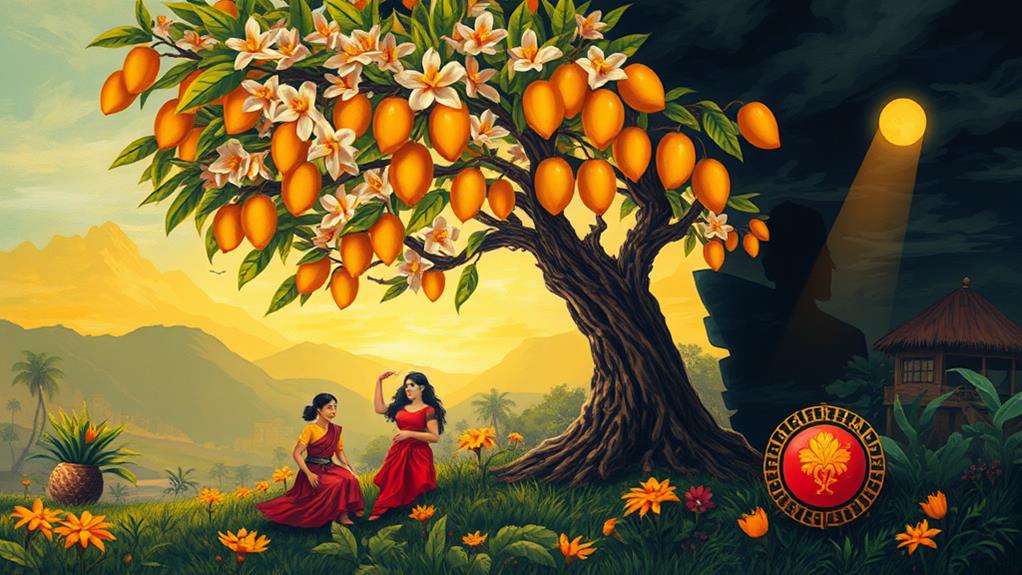Kapalaran, or destiny, plays a significant role in shaping the Filipino worldview. This concept influences daily choices and communal connections, offering comfort amid uncertainty and helping individuals navigate life's challenges, particularly in love and career.
Kapalaran can have both positive and negative effects. On the one hand, it fosters a sense of belonging and provides comfort in times of uncertainty. On the other hand, it can lead to a lack of accountability, causing individuals to rely on fate for personal outcomes rather than taking responsibility for their own actions.
Rituals and practices reflect the importance of Kapalaran in Filipino culture. For example, wearing charm bracelets or consulting fortune tellers are common practices that intertwine spirituality and community customs.
Understanding the implications of Kapalaran is crucial for personal growth and societal dynamics. It is essential to recognize that while relationships may be seen as destined, they still require active effort to succeed.
By acknowledging the influence of Kapalaran, individuals can better navigate their personal and professional lives.
Understanding Kapalaran in Filipino Culture

Kapalaran: A Filipino Concept of Destiny
In Filipino culture, Kapalaran is a deeply rooted belief that destiny plays a significant role in shaping an individual's life. This concept serves as a comfort in times of uncertainty, providing reassurance during significant life moments such as career changes or personal relationships.
Kapalaran attributes life's events to divine orchestration, reinforcing a connection to higher powers. This belief suggests that forces beyond one's control shape their journey. By embracing Kapalaran, individuals can cope with challenges by rationalizing adversities as part of a larger plan.
Kapalaran strengthens social ties through shared beliefs and practices. Rituals, superstitions, and traditions surrounding Kapalaran create a communal bond among Filipinos.
Participating in these practices allows individuals to connect with their heritage and fellow community members. Understanding Kapalaran isn't just about fate, but about embracing a mindset that acknowledges the interplay between belief, destiny, and life's uncertainties.
Kapalaran and Personal Responsibility
Kapalaran Can Undermine Personal Responsibility
Believing in Kapalaran can lead to a diminished sense of personal responsibility among individuals.
When people attribute their successes and failures solely to destiny or fate, they may feel powerless to change their circumstances. This mindset of resignation can stifle personal growth and initiative.
Accepting Kapalaran Without Question Can Hinder Progress
Accepting Kapalaran without question can lead to overlooking the importance of accountability for one's decisions.
This tendency can hinder both personal and community progress. Fatalistic beliefs in Kapalaran may discourage individuals from taking proactive steps to improve their situation or pursue their goals.
Balancing Kapalaran with Personal Responsibility Is Key
To truly thrive, individuals need to balance their belief in Kapalaran with a sense of personal responsibility.
Recognizing that both destiny and personal choices impact life can foster a sense of agency. Embracing this balance encourages individuals to take ownership of their path, enabling personal growth and empowering them to shape their future.
The Role of Fate in Relationships

Fate's Role in Relationships
The Concept of Kapalaran
In Filipino culture, kapalaran is the belief that certain partners are soulmates, destined to be together since birth. This concept instills a sense of urgency in love, compelling individuals to actively pursue their destined connection before it slips away.
Fate's Influence on Perception
Fate's influence is palpable; it shapes how we perceive romantic encounters, leading us to view them as significant and meaningful. The idea that our paths are intertwined often encourages a deeper commitment, as we might feel that the universe has conspired to bring us together.
The Double-Edged Sword of Fate
While the notion of soulmate connections adds a romantic allure to love, it can also lead to complacency in relationships. When challenges arise, it's tempting to attribute them to fate rather than addressing them directly.
Personal responsibility is crucial to balance the notion of fate, ensuring proactive communication and effort in relationships.
The Balance Between Fate and Personal Responsibility
Love requires both fate and active participation to flourish. Embracing kapalaran can enhance our understanding of relationships, but it shouldn't replace proactive communication and effort.
Cultural Practices Surrounding Destiny
Filipino Culture Emphasizes the Role of Destiny
In Filipino culture, destiny is viewed as a guiding force that shapes individual fortunes through predetermined circumstances. This belief is reflected in various rituals and practices, such as the use of charm bracelets or amulets during significant life events like weddings and births.
These charms are worn to attract good fortune and ward off negative influences.
Seeking Guidance from Elders and Fortune Tellers
Filipinos often consult fortune tellers or seek wisdom from elders during pivotal moments in life, such as births, weddings, and business ventures. This guidance helps individuals understand the destiny associated with these milestones, reflecting a collective acknowledgment of fate's role in shaping individual paths.
Community Celebrations and Storytelling
Community celebrations like the "Pista ng Kapalaran" serve as platforms for fortune storytelling, where individuals share personal narratives and reinforce their beliefs in destiny.
These celebrations foster a sense of community and shared understanding, emphasizing the importance of destiny in the Filipino worldview.
Astrology and Numerology
The intertwining of destiny with practices like astrology and numerology adds another layer, as many Filipinos seek insights into their futures based on celestial alignments.
This cultural practice reflects personal beliefs and reinforces the importance of destiny in shaping individual paths.
Kapalaran's Influence on Decision-Making

In Filipino culture, the belief in destiny, known as Kapalaran, significantly influences decision-making.
This belief leads individuals to interpret events as preordained, which can affect their decision-making psychology. Instead of making rational choices, people might follow what feels fated. This perspective creates a paradox where individuals feel a sense of urgency to follow their destined path, yet they believe outcomes are beyond their control.
In romantic relationships, Kapalaran can cloud judgment. For instance, people may view relationships as fated connections, leading them to dismiss partners who don't fit their narrative of destiny. This belief can bring comfort but also diminishes one's sense of agency.
By attributing successes to Kapalaran, individuals might neglect the hard work and choices that led to their achievements.
The interplay between Kapalaran and personal accountability complicates decision-making. By attributing outcomes solely to destiny, individuals risk overlooking the importance of proactive choices in shaping their lives. Embracing both fate and personal responsibility can empower individuals to navigate their path with greater clarity and intention.
Fatalism and Its Societal Effects
Fatalism's Grip on Society
Many Filipinos believe in Kapalaran, a concept that often leads to a fatalistic outlook on life.
This mindset can hinder personal growth and create a cycle of stagnation. When individuals attribute failures to fate rather than taking responsibility for their actions, they become less motivated to make changes. As a result, they may prioritize accepting their circumstances over taking proactive steps to improve their lives.
The Consequences of Fatalism
Fatalism's effects extend beyond individual lives, impacting collective efforts and harming community development.
When people focus on their predetermined paths, collaboration and innovation suffer. Local development projects are often met with apathy, and economic stagnation becomes more likely. This is because individuals are less likely to support initiatives that could uplift their community.
Breaking the Cycle
To counter the effects of fatalism, it's essential to strike a balance between recognizing Kapalaran and embracing personal agency.
Encouraging responsibility and collective action fosters unity and empowers communities to strive for a better future. By promoting a sense of personal accountability and proactive change, individuals and communities can work together to create positive change and progress.
Positive and Negative Filipino Values

Filipino values are shaped by a mix of positive and negative traits that influence societal behavior.
Positive traits include resilience, which enables individuals to bounce back from hardships while maintaining hope. This quality is often demonstrated through cultural hospitality, where Filipinos warmly welcome guests and make them feel at home.
This kindness fosters community bonds and reinforces a sense of belonging.
Familial generosity is another significant value, reflecting the deep commitment to supporting family members and prioritizing their welfare over personal interests. This strong family orientation creates a network of support that helps individuals navigate life's challenges.
Respect for elders is a guiding principle, emphasizing the importance of valuing wisdom and guidance. However, these positive traits can sometimes mask negative aspects, such as a tendency to avoid confrontation or take on too much responsibility, leading to personal neglect.
While these positive traits build a strong communal fabric, it's essential to recognize that they can also perpetuate a cycle of dependency or resignation, complicating the balance between personal agency and cultural expectations.
The Balance of Hope and Despair
The Filipino concept of "Kapalaran" represents a delicate balance between hope and despair. This duality influences an individual's personal journey, encouraging resilience and perseverance in the face of challenges.
For instance, embracing risk-taking and persevering despite adversity demonstrates the spirit of katatagang-loob, which empowers individuals to navigate life's uncertainties with a sense of agency.
However, Kapalaran can also lead to despair acceptance, where individuals resign themselves to suffering and mediocrity, stifling personal growth and initiative. The context of a situation greatly influences how Kapalaran is interpreted, determining whether it becomes a source of motivation or a reason to surrender.
Finding a balance between hope and despair is crucial. This balance serves as a coping mechanism, urging individuals to trust in their ability to manage life's unpredictability while recognizing the pitfalls of passive resignation.
How do Dreams Tie into the Belief of “Kapalaran” in Filipino Culture?
In Filipino culture, “kapalaran” is deeply tied to the significance of filipino dreams. Many believe that dreams are a manifestation of one’s fate or destiny. These dreams are often interpreted as signs or messages from the supernatural world, guiding individuals towards their destined path in life.
Spirituality and Kapalaran

Spirituality and Kapalaran: Finding Harmony in Life's Uncertainties
The concept of kapalaran, or fate, is deeply rooted in Filipino culture, shaping one's spiritual journey and perception of life's events. In Filipino belief, kapalaran is a predetermined path, guided by a higher power, suggesting that everything happens for a reason. This understanding provides comfort and guidance in navigating life's complexities.
Many Filipinos seek spiritual guidance through fate interpretation, especially during significant life events. For example, consulting fortune tellers or practicing destiny rituals helps individuals invoke blessings or gain insights into their destined path. These practices foster a sense of control over what feels predetermined, providing a deeper understanding of one's life journey.
The integration of kapalaran with the Catholic faith enriches this spiritual journey. Experiences of suffering are often interpreted as divine will, viewed as essential parts of one's destiny. This perspective transforms challenges into opportunities for growth, instilling hope in the face of adversity.
Embracing kapalaran can serve as a source of comfort and resilience. By trusting in one's fate, individuals can cultivate a deeper connection to spirituality, reminding themselves that even in moments of despair, there's a guiding force leading them toward purpose and understanding.
This profound understanding enables individuals to find harmony between hope and despair, leading to a more fulfilling life.
Community Impact of Kapalaran Beliefs
Kapalaran beliefs significantly impact community dynamics, shaping how individuals perceive their roles within society. When individuals attribute their life circumstances to fate, they are less likely to take personal responsibility, leading to a lack of motivation for self-improvement. This mindset often results in societal stagnation, as individuals may feel discouraged from pursuing collective goals or initiatives that inspire change.
The acceptance of kapalaran can weaken social bonds, causing individuals to prioritize their personal destiny over collaborative efforts that foster community unity. For instance, in a community that strongly believes in kapalaran, individuals may be less likely to participate in neighborhood clean-up initiatives or volunteer at local charities, as they may believe that their individual fate is more important than collective well-being.
This emphasis on individual fate can stifle community resilience, leaving little room for innovation and adaptation.
Kapalaran beliefs can perpetuate a cycle of resignation, fostering apathy towards challenges that require collective action. For example, if a community faces a natural disaster, individuals who believe in kapalaran may be less likely to take proactive steps to rebuild and recover, as they may believe that their fate is predetermined.
In this context, the notion of kapalaran can hinder cultural evolution, stifling the collective ambition that drives communities forward.
Recognizing the impact of kapalaran beliefs is crucial for nurturing a spirit of collaboration and encouraging a more engaged, resilient community. By understanding how these beliefs shape community dynamics, individuals can work together to create positive change and foster a more proactive, adaptive community.
Questions and Answers
How Does Kapalaran Influence Filipino Storytelling and Folklore?
Kapalaran plays a significant role in shaping Filipino storytelling and folklore. This concept of fate is woven into mythical narratives, influencing the actions of heroes and guiding them through challenges.
In these stories, fate is intertwined with personal choices, illustrating the delicate balance between destiny and individual agency. For example, in the legend of the Sarimanok, a mythical bird, its fate is determined by its own actions, highlighting the importance of personal responsibility.
Filipino folklore often explores themes of resilience and hope. These stories show how characters can transform their lives by embracing their fate and making positive choices.
The legend of the diwata, a forest spirit, demonstrates this theme, as it teaches people to respect and care for the environment, leading to a harmonious coexistence with nature. By examining these narratives, readers can connect with the rich cultural heritage of the Philippines, which emphasizes the interplay between individual agency and the forces of fate.
Are There Specific Rituals to Change One's Kapalaran?
Yes, certain rituals can help change one's kapalaran. These practices often involve offerings, prayers, or symbolic acts aimed at altering one's fate.
For example, in some cultural practices, participants engage in ceremonies that promote healing and renewal, believing these actions can shift their life's trajectory.
The ritual significance lies in their communal and spiritual aspects, which reinforce hope and resilience as you seek to change your kapalaran and embrace a brighter future.
How Does Kapalaran Relate to Filipino Superstitions?
Kapalaran is closely tied to Filipino superstitions, which heavily influence daily life.
In the Philippines, people often consult fortune telling to gain insights into their future, believing it can shape their outcomes. For instance, some Filipinos visit fortune tellers to determine the best days for important life events, such as weddings or business launches.
Additionally, many carry luck charms, like amulets or talismans, to attract positive energy and ward off negativity.
These practices reflect a deeper connection to the belief that one's life path can be influenced by unseen forces of fate.
Can Kapalaran Be Interpreted Differently in Various Filipino Regions?
Kapalaran can be interpreted differently across Filipino regions. This variation is often a reflection of cultural differences shaped by local traditions and histories.
For example, in the Ilocos Region, kapalaran is closely tied to the concept of "pana", which refers to the idea that one's fate is predetermined and influenced by the alignment of stars and planets at birth.
In this region, people believe that their fate can be altered through rituals and offerings.
In contrast, in the Visayas Region, kapalaran is often associated with the concept of "tadhana", which emphasizes the role of personal experiences and decisions in shaping one's destiny.
Here, people believe that their fate isn't fixed and can be changed through their actions and choices.
These diverse interpretations of kapalaran highlight the rich cultural heritage of the Filipino people and demonstrate the complex and nuanced nature of their beliefs about fate and destiny.
What Role Does Family Play in Shaping One's Kapalaran Beliefs?
Family plays a significant role in shaping one's kapalaran beliefs. As you grow, your relatives transmit cultural values that reinforce the idea of kapalaran through stories and traditions.
For instance, your grandparents might share tales of overcoming poverty or migrating to a new country, which influence how you perceive your own fate. These narratives create a framework for understanding life's ups and downs, helping you navigate your path.
Your family's perspectives mold your beliefs, intertwining personal experiences with broader cultural insights.